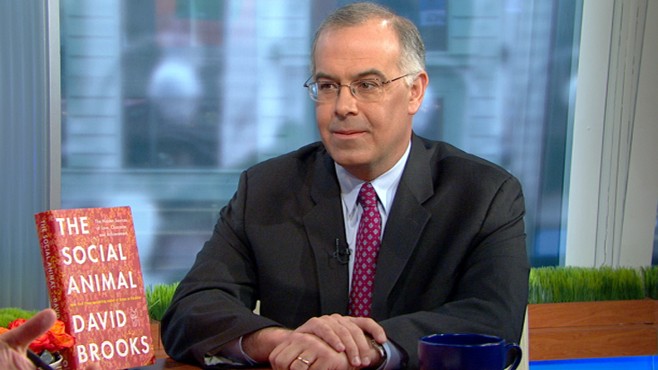 |
| via |
Reviewed by Christine-Chioma
Published: 2011
It's about: David Brooks uses fictional characters to explore "how success happens". To quote the summary on goodreads (cheating): "Drawing on a wealth of current research from numerous disciplines, Brooks takes Harold and Erica from infancy to school; from the “odyssey years” that have come to define young adulthood to the high walls of poverty; from the nature of attachment, love, and commitment, to the nature of effective leadership. He reveals the deeply social aspect of our very minds and exposes the bias in modern culture that overemphasizes rationalism, individualism, and IQ. Along the way, he demolishes conventional definitions of success while looking toward a culture based on trust and humility."
I thought: The book is kind of a mix between books like "Blink" and "How We Decide" but it has a narrative running through it that makes the facts more interesting. I really enjoyed the fictional parts of the book. I liked that Brooks set each story in present day instead of the time period it would really occur in. I especially enjoyed the first portion of the book which covered studies about dating, newlyweds and raising children through the experiences of Harold's parents. I felt that the book got too bogged down in details about Erica's work and the policies found there. I'm not interested in business or business models. I think it deterred from the book's thesis about how social interaction and relationships impact success more than anything else. I preferred my facts mixed in with the story.
 |
| via |
The book really made me think more about my social interactions with others. I love my current job and I know it has more to do with the people I work with and for then the actual duties of the job (cleaning up poop, vomit and urine?) Brooks says "the daily activities most associated with happiness are all social--having sex, socializing after work, and having dinner with friends--while the daily activity most injurious to happiness-commuting--tends to be solitary." At my work we are constantly planning activities and getting together--it reminded me of how Erica wants to be a connector. I also loved
learning that social professions (corporate manager, hairdresser, health-care providers) correlate more closely with happiness than those that are less social (a machinery operator).
However, at times the novel made me feel discourage as if certain things were set. I felt like characteristics about myself were unconsciously inevitable because of my upbringing or background. Then I remembered that the author was using studies and information that proved certain points. Obviously if i cared enough I could find studies that proved the opposite point. Likewise, I could have researched the studies and looked into their methods and the exact results. But I didn't care that much.
Overall, I enjoyed the book. Brooks has a wry sense of humor and insight into human character and personality that was spot on. The book is all about how "succes" happens. But at the end of it, I did not really think Erica was successful or made that many good decisions or had many good relationships. Or at least--she was not successful in ways that I would want to be. Religion did not play a big role in the book, but it plays a big role in my life so I would have liked some more information about that.
Verdict: Stick it on the shelf. It's a good one to have to reference the studies and facts
Reading Recommendations: This isn't a book that is comfortable to read straight through. I read it in spurts and pieces over several weeks. It's a good book for a book club in that you could talk about the definition of success, nature vs nurture, and the interesting tidbits and facts found in the pages, but it's not a book that one would emotionally connect to.
Warnings: Scientific talk about sex. Some swear words.
Favorite excerpts:
 |
| via |
"Erica decided she would never work in a place where people did not trust one another. Once she got a job, she would be the glue. She would be the one organizing outings, making connections, building trust. She would carry information from one person to another. She would connect one worker to another."
"She was in the camp of the more-emotional-than-thou rather than in the camp of the more-popular-than-thou. This meant she was always exquisitely attuned to her superior emotions, and it also meant, unfortunately, that if she wasn't having an engrossing emotional drama on any given day, she would try to make one up."
What I'm reading next: Gone Girl by Gillian Flynn







